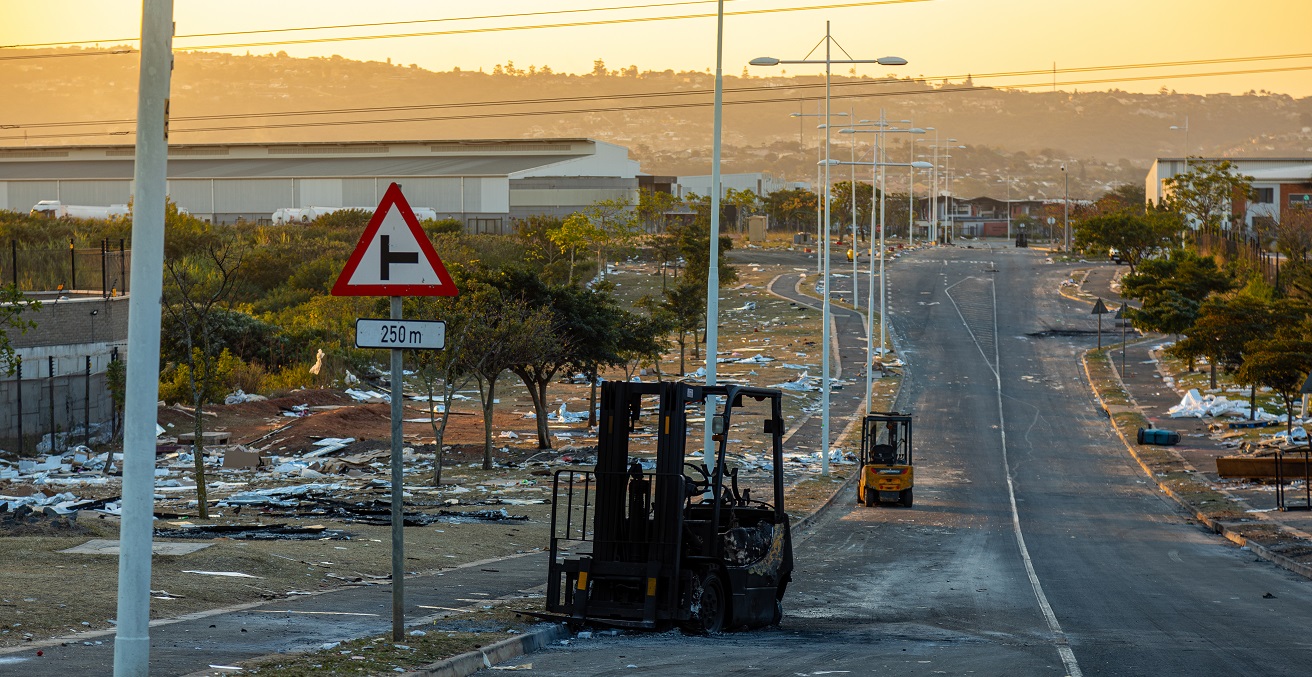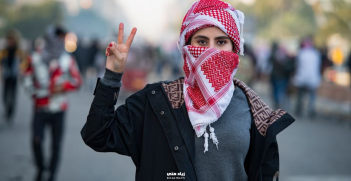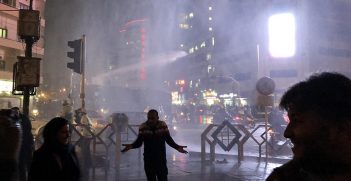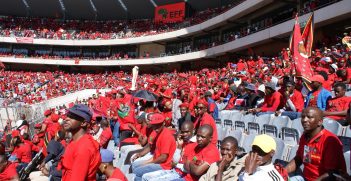South Africa Is Teetering on the Brink of Anarchy

On 18 July 2021, Mandela Day in honour of the leader’s birthday, people in Durban and Johannesburg cleaned up 200 looted shopping malls. The “deferred dream” had gone up in flames.
The vast majority of looters were unemployed youngsters, who came from shack settlements surrounding wealthy white and Indian areas. They were not much interested in Zuma, but well aware of their comparative poverty. They wanted to share in the luxury commodities they saw on TV. Township criminal gangs joined them, ready to transport their screens, electronics, fashionable dresses, liquor, fridges and washing machines in middle-class cars. This combustible tinder box of frustrations was inflamed by a few political instigators on social media, using the arrest of former president Jacob Zuma, a particularly popular figure among Zulu South Africans, as the trigger. They were attempting to “shut the country down,” as practiced in anti-apartheid resistance. The government had unwisely stopped the meagre COVID-19 grants in April. The billionaire current president, Cyril Ramaphosa, with his sombre speeches on good citizenship, appeared remote, indifferent, and aloof. He had sent soldiers to lock everyone up at home in an earlier COVID-19 wave. Now was the opportunity to grab goods unhindered by police or security guards. The joyful looting days epitomized the deferred dream, perversely realised.
Why did the government fail to anticipate the unrest after almost daily “service delivery protests” across the country? The burning of hundreds of trucks on the vital N3 highway between Johannesburg and the Durban harbour started in 2018. Why were power stations and telecommunication towers attacked, water purification plants and reservoirs targeted, and industrial warehouses destroyed? Why was the police largely invisible for a week after the anarchy started? No wonder that self-defense units (militias) spontaneously organised to protect their neighbourhoods. Even the normally out of control taxi associations joined to keep looters away from malls. Citizens’ militias amount to a mixed blessing. They testify to the state having further lost the monopoly of violence. In some cases, the miliatias were responsible for escalating the violence.
New political party alignments
The ruling African National Congress (ANC) can best be characterised as two parties in the process of splitting. It is already a deeply factionalised body, not the unified party its leader proclaims. An emerging Zuma party, including the underestimated Economic Freedom Front (EFF) under the articulate demagogue Julius Malema, confronts a reforming Mandela ANC. These fault lines are manifested in the ANC parliamentary caucus and the civil service, particularly the police and intelligence agencies.
The Zuma ideologues mock Mandela as a sellout to “white monopoly capitalism”. They have re-racialised the ANC and view Desmond Tutu’s desired “rainbow nation” as a pipe dream. The globally admired democratic constitution of 1994, based on a negotiated compromise, is denounced as an instrument of renewed oppression, administered by a collaborating judiciary. A growing African middle class, especially business people, are labelled “compradore black capitalist agents.” ANC politicians are viewed as capitalist “proxies in our leadership.” For a literate Marxist revolutionary, this conceptualisation fits the bill. Its opportunistic South African advocates, however, use socialist rhetoric to legitimise their own corruption. They hoped that making the country ungovernable would force the ANC to oust Ramaphosa and replace him with a Zuma loyalist. The “coup” failed for lack of popular support. Xosas as well as Zulu traditionalists abstained from joining. The police and army remained loyal on the whole, except for some elements in the veteran ANC military wing and rogue Zuma supporters in the security services. Moletsi Mbeki, the brother of the former president Thabo, doubts that there even was an “insurrection.” More likely, he suggests, the government conveniently propagated the coup threat to distract from its own mistakes.
Under Zuma’s presidency, from 2009 to 2018, a growing economy was destroyed by a predatory, self-enriching elite. Neglected townships and informal settlements were deprived of tax revenue, plundered by an extraordinarily high degree of corruption. State-owned enterprises were run into the ground by rapacious bureaucrats. Few contracts were signed without kickbacks. Recently, greedy officials even stole funds set aside for combatting the COVID-19 pandemic. They were quickly suspended by Ramaphosa.
In Zuma’s days crooks were promoted, so that in the end whole departments were “captured.” Nepotism thrived, andsome analysts label the entire ANC a “criminal syndicate” governing a “gangster state.”. The forces that contributed to the inequality now attempt to use their own crimes to recapture power, so that they can keep their hands in the till with impunity.
The Mandela ANC of Non Racialism
The Mandela tradition sought to reconcile a divided society by not treating minorities as enemies. Instead, the political majority was supposed to coexist with political adversaries – with equal rights, protected by a sacrosanct constitution. Mahmood Mamdani praised this vision as South Africa’s unique contribution to global ethnic conflict resolution, albeit in an unfinished project.
Among the Mandela ANC, “non racialism” does not mean colour blindness, given the legacy of apartheid. However, black “economic empowerment” policies or mandated demographic representivity translates into an infringement of individual rights for political liberals. Proposed land transfer policies under the slogan “expropriation without compensation” are resented among (mostly white) land owners and deter investment. The other side argues that if the rule of law impedes inalienable rights, the rule of force (land invasions) is justified.
In South Africa, nonracial measures to narrow the wealth gap have been advocated by the late Afrikaner economist Sampie Terreblanche and the French economist Thomas Piketty, but encountered outright rejection. Perhaps they could now find support even among corporates, if clean administration is guaranteed. An enhanced inheritance tax could achieve similar goals.
To avoid a repetition, the costly upheaval would need to be used as an opportunity for government reform, particularly of self-inflicted wounds. The abolition of “cadre deployment” would need to sit at the top of the reform agenda. Instead of party membership and loyalty, recruitment would have to focus on expertise and integrity and include all qualified applicants. Not long ago, Ramaphosa chaired the “Deployment Committee.” He can no longer afford to put his party’s control ahead of the fate of the nation. Contrary to recommendations from Natal ANC officials, pardoning Zuma in an attempt to gain stability would be a grave mistake.
The world of Zulu politics
The recent upheavals centred on KwaZulu-Natal and Zulu hostels in Gauteng. The provincial ANC structures in Natal saw many unresolved assassinations over access to privileges long before the anarchy. The national ANC received its highest voter support when rural Natal conformed. The ANC’s multi-ethnic origin is always tested when officeholders need to be informally balanced to accommodate all ethno-racial groups.
Eleven million Zulu speakers comprise the numerically strongest ethnic group. The Zulu history of conquest and resistance against British colonisation and apartheid designs differs from the other ethnic groups. So do cultural traditions, like circumcision of adolescent males (abolished by Shaka) and ceremonial leopard skin dress.
In a TV address on 14 July, new Zulu King Msizulu said, “I appeal to you my Father’s people, …to the Zulu nation to withdraw from participation in the destruction of South Africa.” He stated that his “people are committing suicide” and recommended “to embrace the Indians.” The King’s 72-year-old father, Goodwill Zwelithini, had died a few months earlier and left 28 children from six wives. Among the large clan, a bitter feud about his succession ensued. Two months later, Queen Montfombi, also passed away, rumoured to have been poisoned. Economic interest fueled personal animosity.
About a quarter of Natal is owned by the Ingonyama Trust, of which the Zulu monarch is the sole trustee and beneficiary. This outdated tribute to feudalism was a last-minute attempt to bring Buthelezi’s boycotting Inkatha Freedom Party (IFP) into the first democratic election in 1994. Recently, the controversial Police Minister, Bheki Cele, was mandated by the ANC to assist the royal household in the succession dispute. The whole concept of separate laws and a parliamentary “House of traditional leaders” clashes with Western common law. The traditional laws, under which autocratic chiefs control the rural population, disadvantage women in particular. These feudal practices need to be gradually phased out.
Heribert Adam was educated at the Frankfurt School with Adorno as his PhD supervisor. Now an Emeritus Professor of Sociology at Simon Fraser University in Vancouver, he taught also at the University of Natal and the University of Cape Town and has published extensively on South African socio-political developments during several decades.
This article is published under a Creative Commons Licence and may be republished with attribution.





